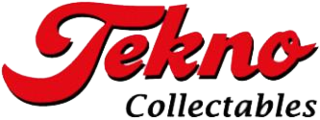
A model car, or toy car, is a miniature representation of an automobile. Other miniature motor vehicles, such as trucks, buses, or even ATVs, etc. are often included in this general category. Because many miniature vehicles were originally aimed at children as playthings, there is no precise difference between a model car and a toy car, yet the word 'model' implies either assembly required or the accurate rendering of an actual vehicle at smaller scale. The kit building hobby became popular through the 1950s, while the collecting of miniatures by adults started to gain momentum around 1970. Precision-detailed miniatures made specifically for adults are a significant part of the market since the mid-1980s.
Dinky Toys was the brand name for a range of die-cast zamak zinc alloy scale model vehicles, traffic lights, and road signs produced by British toy company Meccano Ltd. They were made in England from 1934 to 1979, at a factory in Binns Road in Liverpool.

A die-cast toy is a toy or a collectible model produced by using the die-casting method of putting molten lead, zinc alloy or plastic in a mold to produce a particular shape. Such toys are made of metal, with plastic, rubber, glass, or other machined metal parts. Wholly plastic toys are made by a similar process of injection molding, but the two methods are distinct because of the properties of the materials.

Schuco is a German manufacturing company founded in 1912 by Heinrich Müller and the businessman Heinrich Schreyer in Nuremberg, popularly known as Germany's toy capital. The company's specialty was making toy reproductions of cars and trucks in tin, plastic and die-cast. The company went bankrupt in 1976 but was reorganized in 1993 and then totally independent again by 1996.
1:43 scale is a popular size of die-cast model cars in Europe, Asia and the US. It has its origins in the British / European O scale for model trains and the rise of certain accessories made for that scale which since have become popular in their own right. Models in this scale are 10–13 cm length.

Tekno is a Danish manufacturing company of scale model trucks and other vehicles, currently headquartered in De Lier, Netherlands. Originally established and based in Copenhagen, Tekno began manufacturing construction toys in 1928 and model vehicles immediately after World War II, selling 1 million a year during its peak.

Conrad GmbH is a German manufacturer of diecast scale model trucks, primarily in 1:50 scale for use both as toys and promotional models by heavy equipment manufacturers. Conrad is one of the few European diecast companies which have not outsourced production to China or elsewhere in Asia. Conrad Modelle is headquartered in Kalchreuth, just northeast of Nuremberg.

Meccanica Bessana Toys, was an Italian toy manufacturer that produced die-cast scale model cars during the 1960s and 1970s.

Solido is a French manufacturing company which produces die-cast scale models of cars, military vehicles, and commercial vehicles. Vehicles are usually made of a zamac alloy in varying scales.

Norev is a French manufacturer of die-cast scale model cars. Traditionally based in Villeurbanne, a suburb of Lyon. It has normally produced modern and vintage European vehicles, especially those of French origin – though Italian, German, British, and American vehicles were also produced. Norev's closest competition was Solido, but that company had more pan-European influence, while Norev was more national in orientation.

Polistil S.p.A. is an Italian toy brand and former manufacturing company headquartered in Milan, with production center in Chiari, near Brescia. Polistil specialized in die-cast and plastic scale model vehicles of all sizes.
Eligor is a brand of collector's diecast model cars and trucks mostly made in 1:43 scale. Models have always been made in France, but the company has gone through several ownership changes. Today, though now focusing on model trucks, Eligor is one of the few diecast modelers still making its vehicles in Europe.
Minialuxe is a French manufacturing company that produces and commercialises plastic scale model cars and trucks. The original Établissements Minialuxe was based in Oyonnax, producing models usually made in 1:43 scale, but some larger 1:32 scale vehicles were also manufactured, for example, a Peugeot 403.
Holand Oto is a Dutch manufacturing company based in Weert that produces diecast scale model cars and trucks. The company was established in 1959 in Heerlen as "Bestbox", then changing its name to "Efsi" in early 1970s.
MetOsul was Portugal's oldest diecast toy manufacturer. The original company was founded in the Atlantic coastal town of Espinho a few miles south of Oporto, in 1931. At its high point it was known for making quality second hand castings of Dinky Toys.

Sablon was a Belgian company near Brussels that made diecast zamac toy cars in the late 1960s and early 1970s. Models were mostly in 1:43 scale and were similar in concept to Dinky Toys or Solido.
Société Anonyme de Fabrication d'Injection et de Recherches was a French manufacturing company that produced diecast metal classic veteran and contemporary plastic race cars and other vehicles in the 1960s through the 1970s. It arose out of the previous French toymaker, "Jadali".
Gamda Koor, also known as Sabra was an Israeli diecast toy company that specialized in 1:43 scale cars. Most of these seem to have been original offerings, not seen elsewhere and not secondary tooling. The toy company Cragstan marketed Gamda Sabras as "Detroit Sr." for the American Market.

Mercury was an Italian manufacturing company of die-cast scale model cars. Based in Turin, Mercury was active from 1932 until 1980. Along with Dinky Toys in England, Mercury was a pioneer in 1:43 scale diecast toys made in Europe. Today, Mercury models are rather rare and not easy to find. The company logo was the word Mercury within a rectangle with a round toothed gear behind the company name.











